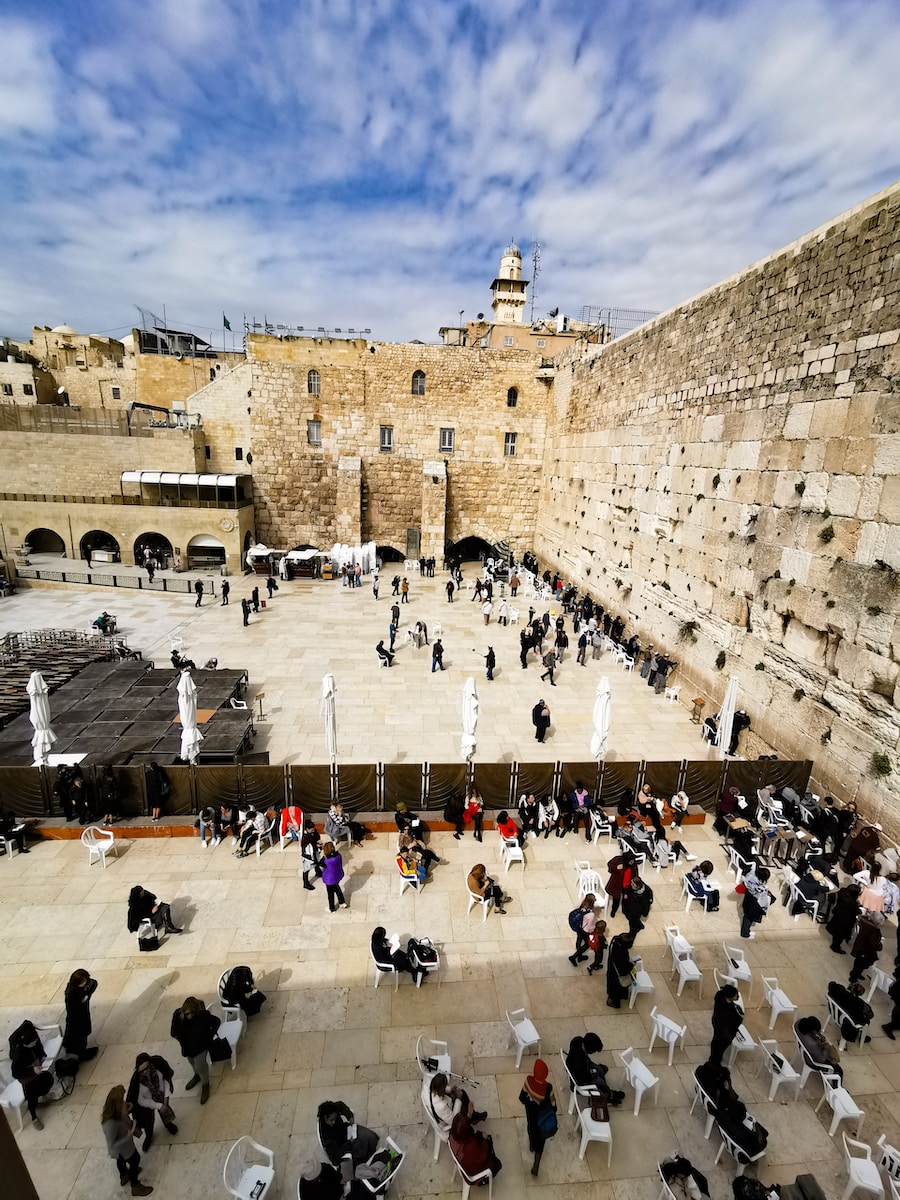Within the vast realm of biblical prophecy, certain verses hold profound significance and offer valuable insights into the nature of divine retribution. One such verse that captures our attention is Jeremiah 30:16, which speaks of the unraveling of those who harm Israel. This verse, situated within the broader context of the book of Jeremiah, carries both historical and theological weight. By delving into Jeremiah 30:16 and its implications, we can deepen our understanding of the concept of divine retribution and its role in biblical prophecy.
Divine retribution, a recurring theme in the Bible, reflects the belief that God will mete out justice and judgment upon those who act against His will. Jeremiah 30:16 specifically directs divine retribution towards those who inflict harm upon Israel. The verse paints a vivid picture of the consequences that await those who oppress and mistreat God’s chosen people. It serves as a reminder that God is just and will act to protect His people from those who seek to harm them.
To better comprehend the significance of Jeremiah 30:16, it is important to grasp the historical and theological context in which it is situated. By exploring the verse within the book of Jeremiah, we can gain a more comprehensive understanding of its message and relevance.
Understanding Jeremiah 30:16
Jeremiah 30:16 is a powerful verse that portrays divine retribution towards those who inflict harm upon Israel. The language used in this verse is vivid and poetic, capturing the attention of the reader and conveying the severity of the consequences that await the oppressors of God’s chosen people. The verse states, “Therefore all who devour you shall be devoured; and all your adversaries, every one of them, shall go into captivity; those who plunder you shall become plunder, and all who prey upon you I will make a prey”.
The imagery employed in this verse emphasizes the certainty and extent of the unraveling that awaits those who harm Israel. The use of terms such as “devour,” “captivity,” “plunder,” and “prey” paints a picture of complete destruction and downfall for those who dare to oppose God’s people. It serves as a warning, reminding oppressors that their actions will not go unpunished.
To illustrate the point further, we can consider the historical context in which Jeremiah prophesied. During this time, Israel faced numerous threats from neighboring nations, particularly the Babylonians. Jeremiah’s prophecy in verse 30:16 can be seen as a warning to those who sought to harm Israel. It conveys the message that God will intervene and bring about retribution for the harm inflicted upon His people.
#DivineRetribution #Jeremiah30:16 #UnravelingofAdversaries #ReciprocalConsequences #ContemporaryReflection #GeopoliticalStage #ChosenPeople #JusticeBeyondMortalActions #PropheticVision #ConsequencesofHarm #DivineDecree #ReciprocalRetribution #UnravelingofPlans #HarmAgainstIsrael #DespoilmentofSpoilers
Divine Retribution in Biblical Prophecy
Divine retribution, as depicted in the Bible, is the manifestation of God’s justice and judgment upon those who act against His will. Throughout the Scripture, we find examples of divine retribution in various forms, serving as a testament to the righteousness and sovereignty of God.
One notable example of divine retribution is found in the story of the Israelites’ exodus from Egypt. In Exodus 7-12, God sends a series of plagues upon the Egyptians as a punishment for their refusal to let the Israelites go. These plagues, which include locusts, boils, and the death of the firstborn, serve as a clear demonstration of divine retribution. They showcase God’s power to bring about consequences for those who oppose Him and His commitment to uphold justice.
Another illustration of divine retribution can be seen in the downfall of the city of Babylon. In prophecies found in Isaiah 13-14 and Jeremiah 50-51, we witness the prediction of Babylon’s destruction. These prophecies speak of the city being brought to ruin and its people being defeated and taken into captivity. The unraveling of Babylon serves as a warning and a reminder of the consequences that await those who harm God’s people.
These examples of divine retribution in the Bible highlight the importance of obedience to God’s commands and the consequences that can arise from turning away from His will. They also demonstrate God’s faithfulness to His people and His commitment to justice. Divine retribution serves as a reminder that God is both just and powerful, and that He will act to uphold righteousness in the world.
The Unraveling of Those Who Harm Israel
In Jeremiah 30:16, the unraveling described refers to the consequences faced by individuals or nations who cause harm to Israel. The verse vividly portrays the downfall and destruction that awaits oppressors, emphasizing God’s protection of His chosen people. Throughout the Bible, we find instances where those who harmed Israel faced divine retribution in various forms, such as military defeats, political downfall, or natural disasters.
One powerful example of divine retribution can be seen in the story of Pharaoh and the Egyptians. When Pharaoh refused to release the Israelites from slavery, God unleashed a series of plagues upon Egypt. These plagues served as a form of divine retribution, each one bringing devastation and suffering to the Egyptians. Ultimately, Pharaoh’s stubbornness and oppression led to the unraveling of his kingdom as the Israelites were set free.
Another instance of divine retribution is found in the story of the Assyrians and their oppression of Israel. In the book of Nahum, we read of God’s judgment upon Assyria for their cruelty and violence. The unraveling of the Assyrian empire came through their defeat and destruction at the hands of the Babylonians and Medes.
These examples demonstrate that those who harm Israel will face the consequences of their actions. The unraveling serves as a reminder that God is the ultimate protector of His people and will intervene to bring about justice. It is a testament to His faithfulness and His commitment to defending those who belong to Him.
Historical Context of Israel
To fully appreciate the significance of Jeremiah 30:16, it is essential to understand the historical context in which it was written. The book of Jeremiah was composed during a tumultuous period in Israel’s history, marked by political upheaval, military threats, and spiritual decline.
At the time, Israel was a divided kingdom, with the northern kingdom of Israel and the southern kingdom of Judah facing numerous challenges. The Assyrian Empire had already conquered the northern kingdom and exiled its people, leaving only the southern kingdom of Judah remaining. However, Judah too faced the looming threat of invasion, this time from the Babylonians.
The Babylonian invasion, which ultimately led to the destruction of Jerusalem and the exile of the Jewish people, was a pivotal event in Israel’s history. It was during this time of crisis and uncertainty that the prophecy of Jeremiah 30:16 was given. The verse offered hope to the people of Judah, assuring them that God would not abandon them and that divine retribution would come upon those who sought to harm them.
The historical context of Israel during the time of Jeremiah 30:16 provides a backdrop for understanding the urgency and significance of the divine retribution described in the verse. It highlights the challenges faced by Israel and the need for God’s intervention to bring about justice and restoration.
Significance of Jeremiah 30:16
Jeremiah 30:16 holds significant meaning within the broader narrative of the book of Jeremiah. It conveys God’s faithfulness to His covenant with Israel and His promise of restoration. The verse serves as both a warning and a word of encouragement to the people of Israel, assuring them that their oppressors will face divine retribution.
The significance of Jeremiah 30:16 lies in its portrayal of divine retribution as a means of divine discipline and ultimate redemption. It underscores the theological concept that God is just and will intervene to defend His people. The verse reminds readers of the enduring covenant between God and Israel and the assurance of His faithfulness, even in the face of adversity.
In the broader context of the book of Jeremiah, the verse is part of a larger message of hope and restoration. Despite the imminent judgment and exile, God promises to bring His people back to their land and restore them. Jeremiah 30:16 serves as a reminder of this promise and the assurance that God’s justice will prevail.
Interpretations of Jeremiah 30:16
Biblical scholars and theologians offer various interpretations of Jeremiah 30:16, reflecting different perspectives on the nature and extent of divine retribution described in the verse. Some interpret the unraveling as a literal downfall of Israel’s enemies, marked by military defeat and political collapse. Others view it metaphorically, emphasizing the spiritual and moral consequences faced by those who harm God’s people.
One interpretation suggests that the unraveling described in Jeremiah 30:16 is not limited to physical destruction but encompasses all aspects of the oppressors’ lives. It encompasses their wealth, power, and influence, as well as their ability to harm Israel. This interpretation highlights the comprehensive nature of divine retribution and its far-reaching consequences.
Another interpretation sees the unraveling as a symbolic representation of the moral and spiritual decay that befalls those who harm Israel. It is a reminder that God’s justice extends beyond physical consequences and encompasses the inner decay that occurs when one opposes His will.
While interpretations may vary, the common thread among them is the certainty of divine retribution for those who harm Israel. These interpretations emphasize the theological significance of the unraveling described in Jeremiah 30:16 and its message of God’s justice and protection.
Theological and Practical Applications
The concept of divine retribution in Jeremiah 30:16 holds theological and practical implications for believers today. It serves as a reminder of the importance of aligning with God’s will and the consequences that can arise from opposing Him.
From a theological perspective, divine retribution underscores the significance of God’s justice and the role it plays in maintaining moral order in the world. It reminds believers that God is not indifferent to injustice and oppression. It provides assurance that God will ultimately bring about justice and judgment for those who harm His people.
Practically, the concept of divine retribution calls believers to examine their own actions and attitudes. It challenges them to align their lives with God’s will and pursue righteousness. It serves as a reminder to live with integrity and treat others with kindness and justice. It also reminds believers to trust in God’s faithfulness and seek His protection in times of adversity.
Understanding and interpreting divine retribution in a balanced and compassionate manner is crucial. It is important to approach the concept with humility and avoid using it as a means of personal vindication or judgment. Instead, believers should focus on the overarching message of divine justice and restoration conveyed by Jeremiah 30:16.
The Role of Israel in Biblical Prophecy
Israel holds a significant role in biblical prophecy as a chosen nation. Throughout the Bible, God establishes a covenantal relationship with Israel, promising to protect and bless them. This covenant has implications for divine retribution, as God acts to defend His chosen people from those who seek to harm them.
The destiny, restoration, and protection of Israel are recurring themes in biblical prophecy. Numerous prophecies speak of Israel’s return from exile, the rebuilding of Jerusalem, and the establishment of a new covenant. These prophecies emphasize God’s faithfulness to His chosen people and His commitment to their ultimate redemption.
Other prophecies, such as those found in the book of Ezekiel, depict God’s protection of Israel against their enemies. These prophecies serve as a reminder that those who harm Israel will face divine retribution. They highlight the unique role that Israel plays in God’s plan and the significance of their relationship with Him.
The role of Israel in biblical prophecy underscores the theological significance of divine retribution in Jeremiah 30:16. It affirms God’s commitment to defend His chosen people and His faithfulness to His covenant. The unraveling of those who harm Israel serves as a testament to God’s protection and the divine justice that underpins His relationship with His people.
Lessons from Jeremiah 30:16
Jeremiah 30:16 offers valuable lessons and insights for believers today. The consequences faced by those who harm Israel serve as a reminder of the importance of aligning with God’s will and the ultimate justice that awaits.
One key lesson derived from Jeremiah 30:16 is the recognition of the consequences of one’s actions. It serves as a reminder that actions have repercussions, and those who harm others will ultimately face the unraveling of their own lives. This serves as a warning against engaging in oppression, injustice, or mistreatment of others.
Another lesson is the importance of aligning with God’s will and treating others with kindness and justice. Jeremiah 30:16 calls believers to live lives that reflect God’s character and uphold His values. It encourages them to stand against oppression and injustice, knowing that God will ultimately bring about justice and redemption.
Ultimately, the message of Jeremiah 30:16 is one of restoration, hope, and divine justice. It reassures believers that God is faithful to His covenant and His promise to protect His people. It calls them to trust in His justice and commit themselves to living in accordance with His will.
Conclusion: Divine Retribution and God’s Covenant with Israel
Throughout the article, we have explored the significance of Jeremiah 30:16 in understanding the concept of divine retribution. The verse serves as a powerful reminder of God’s justice and His commitment to defend His chosen people. It highlights the consequences that await those who harm Israel and the unraveling that will befall them.
Divine retribution, as depicted in Jeremiah 30:16, finds its roots in the historical and theological context of Israel. It serves as a reminder of the challenges faced by Israel during the time of Jeremiah and the need for God’s protection and justice. The unraveling described in the verse is a manifestation of God’s faithfulness to His covenant and His promise of restoration.
As believers, we can draw valuable lessons from Jeremiah 30:16. We are called to align our lives with God’s will, treat others with kindness and justice, and trust in His faithfulness. Divine retribution serves as a reminder that God is just and will ultimately bring about justice and redemption.
In conclusion, the concept of divine retribution in Jeremiah 30:16 offers profound insights into the nature of God’s justice and His commitment to protect His people. It underscores the significance of aligning with God’s will and the consequences that arise from opposing Him. As believers, we can find hope in the message of divine retribution, knowing that God’s justice will ultimately prevail.



